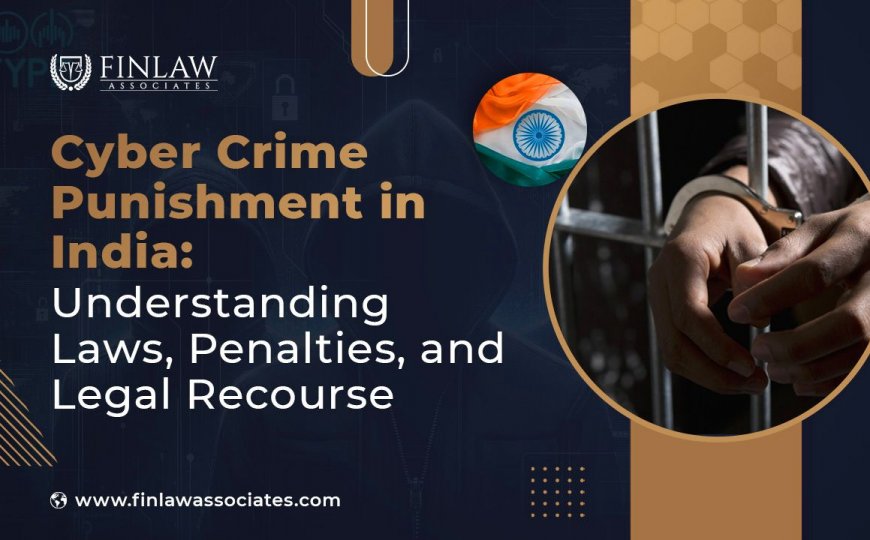Cyber Crime Punishment in India: Understanding Laws, Penalties, and Legal Recourse
Explore India's cybercrime laws, penalties, and legal recourse under the IT Act and BNS. Learn how to report, prevent, and respond to digital offenses.

In the past few years, India has seen an alarming increase in cybercrime, fueled by the rapid advancement of technology and internet access. With an estimated 700 million internet users, the country has become a hotbed for cybercrime, including financial fraud, identity theft, cyberbullying, and hacking. According to the National Crime Records Bureau (NCRB), cybercrime in India surged by more than 300% between 2019 and 2021. This spike underlines the critical necessity for a thorough understanding of cybercrime laws and consequences.
As people and businesses rely more on digital platforms, understanding the legal framework governing cybercrime becomes critical for protecting personal and organizational interests. This article seeks to provide a complete summary of cyber crime punishment in India, including pertinent laws, types of offenses, penalties, and legal options for victims.
Understanding Cybercrime in Indian Law
Definition of Cyber Crime
Cybercrime refers to any criminal behavior carried out over computer networks or the internet. In Indian law, cyber crimes are specified by the Information Technology (IT) Act of 2000, which establishes a legal framework for electronic governance and cybercrime. The Act intends to prevent and combat cybercrime by defining distinct categories of cybercrime and their punishments.
The Information Technology (IT) Act of 2000
The IT Act, enacted in 2000, was a crucial step in creating a legal framework for India's digital environment. It targets a variety of cybercrimes and seeks to promote safe electronic communication. Over the years, the Act has been amended multiple times to keep up with technical improvements and the changing landscape of cyber threats.
Key Sections of the IT Act
-
Section 66: This section addresses computer-related offenses, such as hacking and unlawful access to protected systems.
-
Section 66C: Addresses identity theft, making it illegal to impersonate someone online.
-
Section 66D: This section addresses cheating by impersonation using computer resources.
-
Section 67: This section deals with publishing or transmitting obscene material in electronic form.
-
Section 70: This section protects sensitive data and empowers the government to declare specific systems as protected.
Amendments to the IT Act
The IT Act has been revised several times, the most important of which was in 2008, when provisions for tougher penalties for cybercrime were added, as well as offenses connected to data privacy and online harassment.
Bharatiya Nyaya Sanhita (BNS) and Cybercrimes
In 2023, the Indian government implemented the Bharatiya Nyaya Sanhita (BNS) to replace the Indian Penal Code (IPC) and other associated laws. The BNS seeks to modernize and streamline the criminal justice system, including measures for cybercrimes.
Key Sections on Cyber Crimes in BNS
-
Section 66: Includes charges involving unauthorized access to computers and systems.
-
Section 67: This section focuses on the circulation of obscene materials.
-
Section 68: This section addresses data theft and breach of confidentiality.
These parts offer a more complete framework for combating cybercrime, with an emphasis on digital offenses that have grown common in modern society.
Differences Between Cybercrime and Traditional Criminal Laws
While both cybercrime laws and regular criminal laws strive to protect individuals and society, they differ in several ways:
-
Nature of Crimes: Cybercrime frequently involves technology and digital platforms, although traditional crimes do not always require technological methods.
-
Methods of Investigation: Cybercrime investigations often involve digital forensics and technology expertise, whereas traditional investigations rely on physical evidence and testimony.
-
Jurisdiction Issues: Cybercrime frequently crosses geographical boundaries, complicating jurisdiction and enforcement, whereas traditional crimes typically fall under distinct legal jurisdictions.
-
Penalties: Cybercrime laws typically include rules and penalties tailored to the unique character of online offenses, which might differ dramatically from those in standard criminal law.
Types of Cyber Crimes and Cyber Crime Punishment in India
Understanding the many types of cybercrime and their respective consequences is critical for both potential victims and perpetrators.
-
Hacking and Unauthorized Entry: Hacking is defined as illegal access to a system of computers or network. Hacking under Section 66 of the IT Act may result in imprisonment for up to three years, a fine of up to ₹5 lakh, or both.
-
Identity Theft: Identity theft is the act of impersonating another person online in order to acquire financial or personal benefits. Under Section 66C of the IT Act, this offense can result in imprisonment for up to three years and a fine of up to ₹1 lakh.
-
Cheating Through Impersonation: Section 66D punishes cheating by imitation using computer resources. The penalty may include imprisonment for three years and a fine of up to ₹1 lakh.
-
Obscene Material: Section 67 of the IT Act prohibits the publication or transmission of obscene material in electronic form. Offenders may face imprisonment for up to three years for their first conviction and up to five years for successive offenses, as well as fines.
-
Data Theft: Data theft is the unlawful removal of data from a system. Section 68 of the BNS provides for a maximum five-year jail sentence and/or a monetary fine.
-
Cyberbullying and Harassment: Cyberbullying occurs when people use internet channels to harass or threaten others. Depending on the gravity and type of the offense, it may fall under many provisions of the IT Act and the IPC, with punishments ranging from fines to imprisonment.
-
Cyber Pornography: Cyber pornography involves the creation, distribution, and sharing of sexually explicit material through digital platforms, often without the consent of those depicted. It is punishable under Section 67 of the IT Act, 2000, which prescribes penalties for publishing or transmitting obscene content in electronic form. The punishment for first-time offenders includes imprisonment of up to five years and a fine, with harsher penalties for repeat offenses, extending up to seven years in prison and/or a higher fine.
-
Online Fraud: Phishing, credit card fraud, and online auction fraud are all examples of scams committed online. Offenders can be penalized under several provisions of the IT Act and the IPC, with penalties changing depending on the nature of the offense committed.
Steps To Do If Involved in a Cybercrime Case
If you find yourself entangled in a cybercrime case, whether as a victim or an accused, these are important actions to follow.
-
Document Everything: Maintain detailed records of all communications, transactions, and evidence relating to cybercrime. This documentation might be critical in any legal procedure.
-
Report the Crime: Victims should immediately report cybercrime to the nearest police station or register a complaint online via the Cyber Crime Reporting Portal. It is critical to act quickly to increase the likelihood of recovering lost assets and obtaining justice.
-
Consult Legal Counsel: Seeking legal guidance is critical, especially if you are suspected of a cybercrime. A good cybercrime lawyer can walk you through the legal procedure, explain your rights, and devise a defense strategy.
-
Contact the Cyber Crime Cells: Many Indian states have established specific cybercrime units within their law enforcement organizations. Contacting these specialized departments can give you with expert advice on dealing with cybercrime cases.
-
Implement cyber security measures: If you are a victim, you must take precautionary measures to protect your digital life. This includes resetting passwords, enabling two-factor authentication, and using cybersecurity software to keep your devices secure.
Future Trends and Amendments to Cybercrime Laws
As cybercrime evolves, so must the laws that tackle it. Future trends in cybercrime legislation in India could include:
-
Enhanced Penalties: Given the increasing seriousness of cybercrimes, there may be requests for harsher sanctions, such as lengthier prison sentences and larger fines for serious offenses.
-
More Emphasis on Data Privacy: With increased worries about data privacy, future changes may prioritize protecting personal information and holding firms liable for data breaches.
-
International Collaboration: Because cybercrime frequently crosses national borders, enhanced international cooperation will be critical in enforcing cyber laws and apprehending perpetrators.
-
Adoption of Advanced Technology: Artificial intelligence and machine learning can help law enforcement discover and prevent cybercrimes. Such developments could result in more effective investigations and prosecutions.
-
Public Awareness Campaigns: Raising public awareness of cybercrime and educating people about their rights and safeguards will be critical in addressing these acts. Government initiatives and alliances with technology businesses help improve citizens' digital literacy.
As cybercrime becomes more sophisticated, people, businesses, and society as a whole must comprehend the legal framework governing these acts. The Information Technology Act, together with the Bharatiya Nyaya Sanhita, establishes important standards and sanctions for people who commit cybercrime, with the goal of making the digital world safer. The increasing frequency of cyber accidents highlights the necessity for strong legal frameworks that can adapt to the ever-changing landscape of technology and digital interactions.
In today's digital world, where online interactions are frequent, individuals must be proactive in their cyber security. Awareness of potential hazards, such as identity theft, online fraud, and cyberbullying, can help consumers take the required safeguards. This includes using strong passwords, enabling two-factor authentication, and staying up to date on the newest scams and security practices. Individuals must build a culture of cyber awareness in addition to enforcing the law.
Furthermore, the legal ramifications of cybercrime emphasize the significance of ethical behavior in the digital sphere. As technology evolves, so must our grasp of the moral consequences of our online behaviour. Organizations, in particular, should prioritize cyber ethics by educating staff on responsible digital behavior and the consequences of cyber violations.
Looking ahead, India must regularly update its cybercrime legislation to match the fast changing technology landscape. To effectively tackle cross-border cybercrime, future changes may need to include harsher punishments for serious violations, improved data protection measures, and increased international collaboration. Furthermore, the incorporation of sophisticated technology, such as artificial intelligence, has the potential to transform the way cybercrime is discovered and punished, making law enforcement more effective and responsive.
Public awareness initiatives will also play an important part in this changing situation. The government and organizations can assist citizens feel more empowered to report occurrences and seek justice by informing them about their rights and the legal options available in the event of a cybercrime.
Finally, combating cybercrime involves informed citizens, responsible corporations, and effective legislation. As we traverse the digital world, we must be aware and knowledgeable about cyber security and the legal landscape in order to protect our rights and ensure a secure online environment. We can help to make the digital environment safer for everyone by cultivating a culture of awareness and responsibility.
What's Your Reaction?















